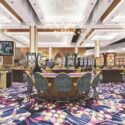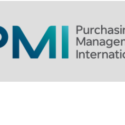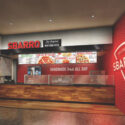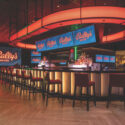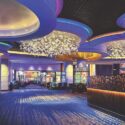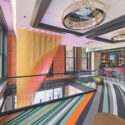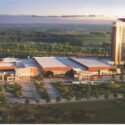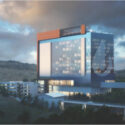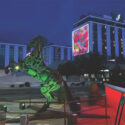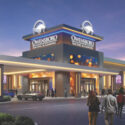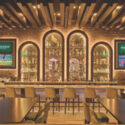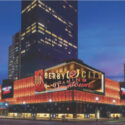
When Seminole Gaming CEO Jim Allen approached the Seminole Nation tribal council about buying Hard Rock International in 2007, he was excited about the possibilities but warned them that there was a lot of work ahead.
“When I came up with the idea to buy Hard Rock,” he says, “I explained to the tribe that this is a long-term commitment. It will take time to grow the brand. This hotel has become the iconic statement of that relationship. The tribe owns Hard Rock and we’re creating something we want the whole world to see. And now the brand is coming up on its 50th anniversary.”
Hard Rock International, chaired by Allen, is experiencing a growth spurt.
Gaming expansion has been one of the core elements of Hard Rock’s strategic thinking since the hotel and restaurant chain was acquired by the Seminole Tribe.
Hard Rock currently is comprised of 259 venues, including owned and licensed hotels, casinos, shops and cafes, in 75 countries. The company also owns the Hard Rock Cafe on the Strip (but not the off-Strip Hard Rock Las Vegas, which is being rebranded under new ownership as a Virgin casino hotel).
Image is Everything
The most dramatic evidence of the growth spurt was presented in October when the tribe’s original casino, Seminole Hard Rock in Hollywood, Florida, unveiled the company’s most dramatic project to date: a guitar-shaped hotel, appropriately named the Guitar Hotel. It’s the first building in the world with that shape, and it comes complete with LED “strings” that literally touch the sky—30,000 feet up.

The existing casino floor at Hard Rock Hollywood was totally redesigned and expanded
Allen’s hotel vision took more than 10 years to come to fruition, but the building is quickly becoming an icon in South Florida, attracting thousands of curious visitors on opening day—including a star-studded cast of guitar smashers, Hard Rock’s signature celebration that opens all its properties.
Steve Peck is an associate principal with Klai Juba Wald, the architects of the project, and was involved from the start. He says Allen’s idea of a guitar-shaped hotel was first taken as a concept, not a complete reality.
“We did a bunch of renderings that were referencing guitars. The hotel was just your standard square hotel, and then we added fins, and those fins gave the profile of a guitar,” he explains.
But Allen wanted to be a little more literal.
“Jim asked, ‘What if we just went big? What if the entire hotel is in the shape of a guitar?’” says Peck. “We didn’t say no, but we told him that there would be a premium cost to do this.
“So we got a contractor and found out what the premium would be and brought it back to him.”
Allen wasn’t dissuaded by the extra millions that it would cost.
“We’re in South Florida,” he said. “This is the headquarters of Hard Rock International. We’ve got to go big.”
Allen believes that this $1.5 billion expansion elevates the Seminole Hard Rock to a destination resort level.
“The original facility was beautiful and we had a lot of success with it, but we wanted to create something that was more of an integrated resort—something more than just a locals casino,” Allen explains. “That was the goal, and the budget mirrored that thought process, and hopefully the guests will love it.”
Design and construction of such a building was complicated and time-consuming. Strict Florida building codes—including a 450-foot height limit due to the flight path of nearby Ft. Lauderdale-Hollywood Airport and high wind resistance standards—had to be addressed.

Johnny Depp was just one of hundreds of celebrities who gathered to celebrate the opening of the Guitar Hotel
Klai Juba Wald, which also designed the original Seminole projects in Hollywood and Tampa, brought in interior designers the Rockwell Group and landscape designers EDSA. They also retained New York-based DeSimone Consulting Engineers to put the puzzle together. Allen remembers a conversation with the founder.
“(Owner) Vince DeSimone called me and told me I lost my mind,” laughs Allen. “But he did a great job as usual.”
DeSimone accomplished the difficult task, which at times required support columns at wildly different angles, so as much as 40 degrees.
The project completely changed even the existing Hollywood Hard Rock casino, which remained open throughout the three years of construction. The result is more than 1,400 rooms and suites, 195,000 square feet of gaming space, a 13.5-acre pool and lagoon experience with overwater cabanas, an ultra-luxury spa and fitness center that spans 42,000 square feet, more than a dozen restaurants, multiple bars, an elegant spa and many other non-gaming amenities, including a new 7,000-seat live performance venue, Hard Rock Live.
Allen compliments the guests who continued to arrive despite construction barriers.
“Our customers have been so loyal and tremendously supportive of what we do here,” he says. “But they were very patient. One day a wall was here, the next day it’s over there. We moved restaurants around, we moved roads. So to put all this major construction behind us is great for the property but more importantly for our guests.”
Detail-Oriented
Peck says the secret to the success of the Guitar Hotel was paying attention to details.
“You have to get through approvals and the building department,” he says. “You have to make sure that the structural drawings are being met. You have to make sure that we’re not having dead-end corridors, because the shape of the tower requires a few other considerations.”

If 7,000 seats can be called intimate, it’s the new Hard Rock Live! theater
The siting of the building was determined by the height, which was limited due to FAA regulations. And the shape of the building determined how many rooms it would accommodate, with the goal of around 300.
“We took the floor plate, we systematically went from level 4 all the way up to 33, and with that comes the number of keys,” Peck says. “But we go by modules, not necessarily keys. As we went up, we put a matrix together, and by way of the fluctuation of the guitar tower, when it goes from wide to narrow to medium—I call it the hips, and the waist and the shoulders.”
At the “waist” there are some spectacular suites with balconies, but on the top floor is where the real “wow” factor kicks in.
“We have two pools and two suites on level 33,” he explains. “The suites are probably over 3,000 square feet. They’re symmetrical, one side of the tower to the other, and we said that we’re going to have a wonderful opportunity for the customer to look over to Miami, to look over to Fort Lauderdale, to have a pool right at their feet, and that’s exactly what we did.”
Food and beverage was a focal point of the expansion, and Peck says attention was paid to every kind of customer.

The standard room at Hard Rock Hollywood is anything but standard
“They had multiple interests in trying to carve out signature restaurants for every level,” he says. “So, it’s everything from the food court to high-end steak and seafood. And over the course of time, we developed all these restaurants that covered every taste and wallet in the market. There is every gamut in this place, and we just methodically picked away at each restaurant, one at a time, got our team together. There are bars and nightclubs. We all collaborated to come together one at a time. While not every one of these 20 restaurants happened at the same time, they were all ready on opening day.”
Retail wasn’t ignored either. A promenade hosts an eclectic variety of merchandise and services—including the traditional Hard Rock gift shop.
“It’s a really good mix of locals and people who have been involved with the tribe,” Peck explains. “Maybe one tenant has something up in West Palm Beach, maybe it’s a handbag store or a sunglasses shop. Seminole Gaming put that all together. Our role was to talk to the owners, determine what their budget is, and we’re going to build this out as fast as we can.
“As part of the master plan, the Rockwell Group out of New York City was the one who put that whole retail section together. It’s got a serpentine layout; it’s not a straight shot. It’s got high walls and low walls. Anything below 12 feet was open to design, and of course, the whole thing is entirely covered with a skylight. So the days of dark casinos are a thing of the past. This place is flooded with natural light, and it’s very comfortable for a demographic that enjoys shopping and walking and looking.”
The “wow” factor of the arrival is a feature called the Oculus. Peck says it took a long time to design because there were a lot of considerations.

The Oculus is a water feature that welcomes visitors
“We committed to a diameter of about 140 feet,” he says. “Over time—meaning at least three years, if not four or five—concepts came together. Rockwell Group has a subsidiary called Lab, and they’re more on the technical nature of things. We decided that it would be water, projection, fire, music, entertainment, a show on every hour. We had countless meetings on how to pull this together. And every time you come up with a scheme, it comes with a new budget. The fire was value-engineered out. It didn’t make it. There was a concern that the largest fire display in the world was going to be a little bit concerning to the fire department.
“For the water, we worked with WET, out of Burbank, California. People know WET by way of the Bellagio fountains, and we worked with them to come up with a concept and to pursue it and to push it and to engineer it and to see how it would come together. Other than fire, they incorporated the other aspects, as well as the programming content to do a show. So there’s projection, there’s music and it’s all choreographed. We knew we were going to make a commitment to the Oculus, and we knew that it was important because it was at the front door.”
The true gem of the property is the Oasis Tower, a low-rise building that overlooks the pool and the Guitar Hotel.
“There are three components in the Oasis Tower,” Peck says. “The first component is the first floor. It’s a single-loaded corridor, which means the entire corridor is on one side of the building and it’s serpentine-shape. Every room on the pool side is a suite—your own private villa, you walk out the door, you have two chaise lounge chairs, and you just walk down into the pool. And there’s eight of those. On the second level and up, it’s two-sided; now it becomes a double-loaded corridor. There are rooms on one side, and there are rooms on the other. The rooms on the pool side—every one of them—from floors 2 through 8, has a balcony. Some people would say that that is actually the better tower to stay in.”
But the star of the show is the pool, for which Peck credits the design team at EDSA.

The retail promenade features an eclectic selection of merchandise
“They schemed together all the pieces and the parts to have multiple pools,” he explains. “We have a VIP pool, with a swim-up lake, and a general pool, which is for the customers staying at the hotel. We’ve got the swimming lake, which is three acres in and of itself. We’ve got a swimming river, we’ve got an area for a stage and outdoor concerts. There are multiple waterfalls. We’ve got cabanas that are literally built by the tribe, based on 400 years of construction, and those are what we call the ‘chickee’ huts. And then we have the Bora-Bora experience—20 cabana structures that we built from scratch. Every one of them includes 360-degree pools with a six-inch wet deck, a four-foot pool, and your privacy. Each of them has its own restroom. They are side-by-side, and you’re not going to get a better view of the tower, from that location.”
Hollywood and Beyond
But Hollywood Hard Rock is only the latest in new and improved facilities. Two weeks before, Hard Rock completed an expansion of the nation’s most profitable casino, Hard Rock Tampa. The following week, Hard Rock Hotel Los Cabos opened in Mexico, and in early November Hard Rock Sacramento at Fire Mountain debuted. (See page 24.)
Allen says the Tampa expansion was important to a casino that is one of the most successful in the country in terms of gross gaming revenue.
“We just did an $800 million expansion of the Hard Rock in Tampa,” he says. “And it came out great. There are those that think Tampa is prettier than Hollywood. They’re different architectural palliates, but at the same high level of quality, materials, fit and finish. What we created in Atlantic City certainly made a major statement in that market. It’s what we’ve been doing for a long time, but it’s certainly different than the traditional Hard Rock Cafe.”
A year earlier, Hard Rock Atlantic City opened, just nine months after the purchase of the former Trump Taj Mahal was completed. Just recently, the property became the second-highest performing casino in the market.
But although Allen is proud of the property itself, he isn’t happy with Atlantic City and New Jersey government.
“Candidly, we’re disappointed in Atlantic City,” he says. “There’s no other way to say it. I received so much criticism for putting half a billion dollars into this project. We didn’t go borrow that money. Seminole Hard Rock Entertainment wrote a check for $510 million in cash. There’s no debt on the facility. We do have minority partners who worked with us. There were all kinds of promises that Trenton and CRDA and the city made. And none of them were kept. I think Atlantic City is in worse shape today than it was two years ago. And that’s a shame.”
Allen traces this Hard Rock growth spurt to management changes made several years ago.
“We were really able to restructure the company,” he says. “We expanded the hotel and casino divisions. We never want to forget the cafes and the relationships with our franchise partners, but the restaurant business is very difficult on a global basis.”
On the horizon is a casino in Gary, Indiana, proposals to build casinos in Rockford, Illinois and Bristol, Virginia, and a second tribal casino in California.
Internationally, Hard Rock is one of three finalists for an integrated resort in Greece at the former Hellikon Airport near Athens.
“We are competing in Athens,” Allen says. “Three submitted, but we’ve been told verbally that only two have qualified to be the finalists, ourselves and Mohegan Sun. We respect Mohegan. I worked directly for Sol Kerzner when we built it, so I know what was created there back in 1995. We know their facility and respect them, but we have a lot more experience internationally. We’re in 75 countries around the world and have been doing that for almost 50 years. We have vast experience working with local culture, government, currencies. When the dollar is strong people think that’s good for our business. The opposite is true; it’s better when the dollar is weaker. When companies haven’t experienced that, it’s a learning curve. There’s no learning curve with Hard Rock International.”
Hard Rock has also won a bid to build an IR near Barcelona in Catalonia, although Allen admits that with political upheaval in Catalonia, the company has more work to do.
Allen says the guitar theme will be replicated in Mexico City and possibly in Japan, where the company has been laser-focused on the Hokkaido prefecture. While it’s not the biggest region in Japan, Allen says it’s still a worthwhile effort.
“My analogy has always been, everyone who trains for the Olympics wants to win the gold medal,” he says. “But there’s nothing wrong with a silver or a bronze. We felt we had a better chance to plant our flag in Hokkaido than either Osaka or Tokyo, so we’ve spent a lot of time working with local government, vendors and communities.”
Meanwhile, Hard Rock International has its eyes on the Las Vegas Strip, and the timing would appear to be right for the global gaming and hospitality giant to make a move.
Eldorado Resorts, which is buying Caesars Entertainment, has said at least one of Caesars’ eight destinations on the Strip is likely to be sold after Eldorado completes its $17.3 billion acquisition of the gaming giant sometime in the first half of 2020. Observers have identified a number of well-known Caesars names that could wind up on the block: Bally’s and Planet Hollywood, to name two, and possibly Paris.
In a recent interview with Bloomberg Radio, Allen said the Strip is “certainly” on the company’s radar. “We look at this as a great opportunity for our brand.”
Allen said he finds Planet Hollywood “very interesting” and believes Bally’s also is “one of the possibilities,” given it’s located on “one of the most legendary corners” on the Strip.
Allen explains to GGB that although interesting, the rights to the Hard Rock name in Las Vegas still have to be clarified, and nothing will happen until the original Hard Rock Las Vegas, never a part of Hard Rock International, closes for renovation and rebranding to a Virgin hotel in February.
Still, a Las Vegas presence for Hard Rock seems to be inevitable.
“I think it would be good for them,” says Michael Parks, senior vice president of real estate giant CBRE and a member of its gaming group. “With Las Vegas being one of the most recognizable leading markets in the world it shows they’re a true player in the global gaming arena.”
Brendan Bussmann, a partner with Global Market Advisors, says a Strip asset could give Hard Rock a “leg up” as it competes for one of those highly coveted licenses.
“Nevada still holds the gold standard of that (gaming) regulatory structure, (and) the Japanese have definitely signaled throughout this process that they want a strong regulatory market,” he says. “Anyone licensed here can operate in a much more meaningful way in Japan.”
The reason for the Hard Rock success is simple, according to Allen.
“We’ve got the best balance sheet in the business,” he says. “And we’ve got the support of a great tribal council that encourages us to invest and make the business stronger.”
The Long and Winding Road
Persistence pays off for California tribe with a Hard Rock casino hotel near Sacramento

Hard Rock and tribal officials celebrate the grand opening of Hard Rock Sacramento with the traditional “guitar smash”
The Estom Yumeka Maidu Tribe of the Enterprise Rancheria never lost hope in the 17 years that it took to persuade the state and federal governments that the tribe indeed met the criteria to open a casino in California. And the end of that road arrived in late October, when the Hard Rock Hotel and Casino Sacramento at Fire Mountain debuted to rave reviews.
And to make it all the more sweeter, the tribe employed another tribe, the Seminoles of Florida, to help build and operate the casino.
“This project is the first of its kind, with two tribes joining together to bring this integrated resort to life,” Enterprise Chairwoman Glenda Nelson said at the grand opening. “We are proud of our partnership with Hard Rock and the Seminole Tribe, and we are enthusiastic to continue collaborating to provide guests with an unparalleled entertainment destination experience.”
Mark Birtha, the highly respected gaming executive chosen by Seminole Gaming to lead the Sacramento project, said it was a very emotional day.
“The tribal members were literally pinching themselves,” he said. “This is something that they have been dreaming about, and to see it come to life has been extraordinary. And what has been more satisfactory for me was to hear how they considered themselves very fortunate and blessed to have the vision to partner with the Seminole Tribe of Florida to bring the Hard Rock here.”
The experience was similar for the Friedmutter Group Architects, which had been working with the tribe for many of those 17 years. Suzanne Couture, vice president of interior design, says there were many partners, investors and master plans along the way, but until Seminole Gaming came along, nothing had jelled.
“We could see how excited the tribe was to have an internationally recognized brand added to the mix,” she says. “This was a huge turning point for them, and allowed them to see where they were going to be able to position themselves inside of that market. We knew it was real once that relationship was built.”
Luckily for Friedmutter, they already had a relationship with Seminole. Joe Emanuele, Hard Rock’s senior vice president of design and construction, once worked for Friedmutter, so the respect is mutual. Bob Dollar, senior vice president with Friedmutter, says it was the perfect fit.
“We consider ourselves to be an extension of Hard Rock,” he says. “We try to work almost as their in-house architects and designers. We listen to them. We go to all their meetings. We’re hearing the program and the design direction evolve as it’s happening.”
Birtha says Hard Rock Sacramento has raised the bar in a crowded gaming market.
“Along with the recognizable brand,” he says, “we’ve opened up this building at $450 million-plus with absolutely amazing finishes and a great product. It is truly an integrated destination resort with all the services and amenities and the quality that you would expect of an IR.”
Dollar says the first thing that changed when the Seminole partnership was inked was the addition of a hotel.
“In that market, you’ve got many existing properties within a 50- or 100-mile radius or, with many different names that have been established over the years,” he says. “But with Hard Rock, they were confident they could fill the hotel rooms.”
Birtha says the idea was to give visitors a wide range of experiences.
“We wanted to offer all of the amenities including hotel, gaming, food and beverage, meeting space, entertainment, spa, pool… so that people would come here not only to have the gaming experience but also a non-gaming experience,” he says. “And that’s where the industry has evolved into. And putting the Hard Rock brand on the property appeals to a large number of people who may not have gaming-specific needs. So we wanted to have a size and scope that would cater to everybody in the marketplace, whether they’re coming here to play slots or tables or they just want to have a great meal and stay in a great hotel to have a weekend getaway. We wanted to have more than slots in a box.”
Like all Hard Rock properties, Sacramento has several “wow” features.
“The marquee board we have out front, it’s just so dynamic and exciting,” he says. “It’s definitely a Kodak moment—or an Instagram moment these days. People walk in the door, and there’s another wow factor of the exploding guitar on the ceiling. The extraordinary finishes of the property just create a real wow experience. And it’s those authentic experiences that rock what we deliver.”
Developing those “wow” factors was a true collaboration, says Couture.
“For the exploding guitar, we worked with a variety of people and organizations,” she says. “The decorative lighting and audio-visual elements extend all the way through from the main entry to the Hard Rock Cafe feature bar. The exploding guitar has fire-like colors on it, and licking flames coming out of it. It’s just an amazing decorative light fixture piece that we really developed with Hard Rock and all of their great design resources that they have in house along with custom fabricators. We showed every element to the tribe along the way and got their feedback and input on it.”
Most important to the tribe and to the casino was instilling the corporate culture that has been made famous at every Hard Rock facility, whether it be a cafe, a hotel or a casino.
“We want to save the planet, take time to be kind, and all the other mantras Hard Rock has become known for,” says Birtha. “We bring those things to life, and I think our employees here since the opening get to experience it. They had a lot of fun. They work hard, they get to know the brand. We bring our corporate people in from all around the world. What is important to the Hard Rock brand, to the company, to the vision, to the philanthropy that we do to community relations and the focus on delivering these incredible experiences, is not about selling commodities. We sell experiences.”



